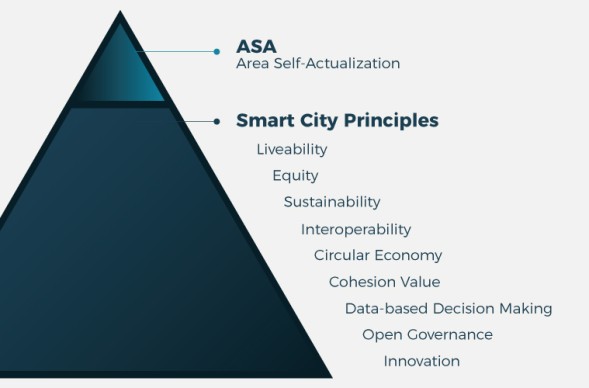Area Self-Actualization refers to a geographic area that has achieved its full potential regarding the environment, people, their behaviour, and the interaction of products and services. In this line, Smart City Development offers the path to its achievement. In the following article Karlind Govender, Alumni of the Master’s in Global Smart City Management, goes into detail on this topic and wonders what impact its application could have on South Africa and the rest of the developing world.
Grant Morrison said, “Before it was a Bomb, the Bomb was an Idea.”
Exploding and imploding is a reality, but when so, so rises the contrary… with antidotes and ideas. Perhaps, Area Self-Actualization is one of those ideas.
Area Self-Actualization refers to a geographic area (city, suburb, country or planet) that has achieved its full potential regarding the environment (infrastructure or not), people, their behaviour, and the interaction of products and services.
Area Self-Actualization (ASA) is inspired by Abraham Maslow’s theory of human motivation1 , which envisages self-actualization being the final stage of personal human needs that sits at the top of his theory pyramid. ASA instead applies fulfillment needs and the impact thereof, beyond the individual self, to the broader eco-system of a designated area or single aggregation of areas.
Considering that areas are largely in constant change, whether evolving, seemingly motionless, devolving or even reinventing itself… for whatever reason, areas can either become self-actualized or not.
Whether in the developed world or so-called developing world, Smart City Development offers the path to Area Self-Actualization. While there is not one quintessential definition of what a Smart City is, there are by and large commonly agreed Smart City Development Principles. These principles when viewed through the prism of ASA become its vertical base and mid.

Figure 1: Area Self-Actualization Prism, by Karlind Govender
Smart City Development Principles:
- Liveability
- Equity
- Sustainability
- Interoperability
- Circular Economy
- Cohesion Value
- Data-based Decision Making
- Open Governance
- Innovation
Area Self-Actualization Prism and Smart City Development Principles for the developing world
Smart City Development Principles, and the Area Self-Actualization Prism can be applied to both new and existing area plans.
The so-called developing world, though producing great innovation from time-to-time, sadly suffers numerous negative developmental issues. These conditions are often severe and ultimately detrimental to Area Self-Actualization.
South Africa is a developing nation with a Human Development Index of 0.705
2 and population of just over 60 million people in 2021.
In 2016, South Africa emitted more than 497 million tons of Greenhouse Gases
3(GHGs), and according to carbonbrief.org, is the world’s 14th largest emitter of GHGs.
Statistics South Africa
4 (Stats SA), published the official unemployment rate in South Africa which has increased from 32.5% in the fourth quarter (Q4) of 2020 to 32.6% in Q1 in 2021. The rate under the expanded definition, which determines that those who have given up on looking for a job be included, is now 43.2%. Youth unemployment under the expanded definition is a shocking 74.7%.
The environmental and socio-economic statistics mentioned above is clear evidence that not only has the bomb dropped, but that the explosion is already underway, and decimating much in its direction.
What can the Area Self-Actualization Prism and Smart City Development Principles do for South Africa and the rest of the developing world?
Cameron Dugmore, Leader of the Official Opposition in Western Cape Provincial Parliament
5 replied,
“Dealing with the South African legacy of colonialism, apartheid and other forms of corruption will take concerted efforts from the public sector, private sector, civil society and the citizen. In South Africa, and other developing nations, the socio-economic conditions and environmental behaviour is dire. Area Self-Actualization is a good idea as it does not separate idea from implementation, which is often the case with many strategic approaches.”
He also said, “Ideas should not be devoid of implementation and I think this is where Area Self-Actualization and Smart City Development Principles succeed. If we want to talk ideas that are intrinsically implementable, and plans that speak directly to the interconnected problems we are facing, and do so in a way that is accessible for all spheres of society, then we should raise Area Self-Actualization and Smart City Development Principles to top of mind.”
The majority of municipalities in South Africa did not receive a clean audit for the 2019/2020 financial year. Auditor-general, Tsakani Maluleke reported that more than a whopping R26bn in irregular expenditure occurred at South African municipalities, with 246 of the 278 municipalities being affected
6.
Only 27 municipalities received clean audits for the said financial period, which is a decrease since 2015/2016, which then stood at 33 clean audits.
If Area Self-Actualization and Smart City Development Principles were applied to municipalities, what could the outcome and impact be? Perhaps, it’s necessary to
pilot it at a few municipalities and provincial governments.
References
- https://www.simplypsychology.org/maslow.html
- https://worldpopulationreview.com/country-rankings/developing-countries
- https://ourworldindata.org/greenhouse-gas-emissions
- http://www.statssa.gov.za/publications/P0211/Media%20release%20QLFS%20Q1%202021.pdf
- https://www.wcpp.gov.za/
- https://www.agsa.co.za/Portals/0/Reports/PFMA/201920/2021%20PFMA%20Media%20Release%20FINALISED%202.pdf
Author: Karlind Govender, Strategic Wrangler | Imagineer | Project Fire-Starter is a Management Consultant and Contractor proficient in smart city management, socio-economic solutions, marketing, technology, design & public benefits. To date, he has delivered solutions across numerous industries, including work for blue chip brands, local and provincial governments, SMMEs & international and non-governmental organisations. Operating through his consultancy MAGICMILL, he pursues results via break through innovation, exponential thinking and solutions in emerging and established markets.


 Figure 1: Area Self-Actualization Prism, by Karlind Govender
Smart City Development Principles:
Figure 1: Area Self-Actualization Prism, by Karlind Govender
Smart City Development Principles:
